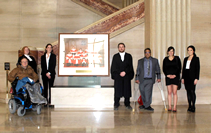Act Now

Empower U: Learn to Access Your Disability Rights Training on Canadian Human Rights, the Convention on the Rights of Persons with Disabilities (CRPD) and its Optional Protocol (OP) training aims to increase awareness of how to address discrimination using more familiar Canadian human rights laws such as Human Rights Codes and the newer international Convention on the Rights of Persons with Disabilities (CRPD). This is training for persons with disabilities by persons with disabilities. The training is part of a project funded by Employment and Social Development Canada and implemented by the Council of Canadians with Disabilities (CCD) in collaboration with Canadian Multicultural Disability Centre Inc. (CMDCI), Citizens With Disabilities – Ontario (CWDO), Manitoba League of Persons with Disabilities (MLPD) and National Educational Association of Disabled Students (NEADS). Read more.
Sign Up for our monthly digest
A monthly newsletter from CCD about what is happening in the community
Supreme Court of Canada Hears Access to Education in Disabled Student's Case
Related Documents
April 17, 2024
Council of Canadians with Disabilities : 48 years strong and "On The Road to 50 Years"
March 21, 2024
Everyone has a responsibility to end racism
December 10, 2023
International Day of Human Rights
March 22, 2012--The Supreme Court of Canada will hear the case of Jeffrey Moore, a student with a learning disability who has fought for years to ensure that students with disabilities have equal access to education. This case is about ensuring that the legal duty to accommodate persons with disabilities is interpreted and applied in a manner that ensures that all students have full and equal access to education. Education is a service that governments in Canada are required by law to make available to all students. Just as the Deaf need sign language interpretation to allow them to communicate and access a variety of services, so too do students with learning disabilities require supports and accommodations to benefit equally from education. When governments or school boards fail to adequately accommodate students with learning disabilities the discriminatory effect is to entrench the marginalization and isolation experienced by so many Canadians with disabilities.
Canada in March 2010 ratified the United Nations Convention on the Rights of Persons with Disabilities. Article 24 of the Convention requires States Parties “to recognize the right of persons with disabilities to education. With a view to realizing this right without discrimination and on the basis of equal opportunity, States Parties shall ensure an inclusive education system at all levels….”
“Access to education, including effective accommodation, is fundamental to ensuring that persons with disabilities will become full and equal citizens, able to participate equally in the workforce and all aspects of Canadian society,” said Dean Richert, Co-chairperson of CCD Human Rights Committee.
“Effective individualized support measures must be provided in educational environments to ensure that students with disabilities are able to learn and participate equally with their nondisabled peers,” states Yvonne Peters. Peters, Gwen Brodsky and Melina Buckley are co-counsel to CCD in the Moore case.
“Education is and must be a universally accessible service for all students and that includes students with disabilities,” states Anne Levesque Co-chairperson of CCD’s Human Rights Committee.
CCD, a national organization of persons with disabilities, is intervening in this case to ensure the right of students with disabilities to equal access to education is confirmed by Canada’s highest court.
-30-
For More Information Contact:
Dean Richert, Co-chair CCD Human Rights Committee - 204 - 989-2760
Anne Levesque, Co-chair CCD Human Rights Committee - 613 - 237-4740 Ext 3 (also available for interviews en Français)
Yvonne Peters, Legal Counsel - 204 - 832-0681
Laurie Beachell, National Coordinator - 204 - 947-0303

Some members of the CCD team at the Supreme Court of Canada on April 25, 2018 to intervene in S.A. v. Metro Vancouver Housing Corporation. (L. to R. Bob Brown, CCD Human Rights Committee member, Dianne Wintermute, legal counsel (ARCH), Dahlia James, a second year JD candidate at U. of Ottawa and Prof. Ravi Malhotra’s Research Assistant and Luke Reid, legal counsel (ARCH) , and Prof. Ravi Malhotra, a member of the Human Rights Committee, Prof. Anne Levesque, Chair of the Human Rights Committee, and Erin Carr, a second year JD candidate.
The Latimer Case
The Latimer case directly concerned the rights of persons with disabilities. Mr. Latimer's view was that a parent has the right to kill a child with a disability if that parent decides the child's quality of life no longer warrants its continuation. CCD explained to the court and to the public how that view threatens the lives of people with disabilities and is deeply offensive to fundamental constitutional values. Learn more.
